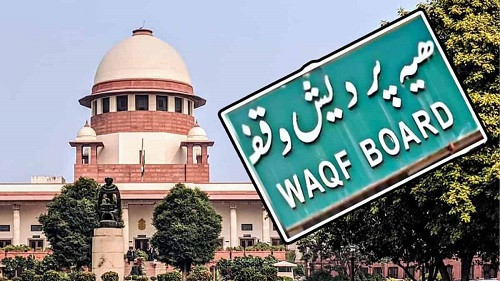Centre Informs Supreme Court of 116% Surge in Waqf Land Post-2013 Amendment

IIE Digital Desk : The Union Government has informed the Supreme Court of India that the enactment of the Waqf (Amendment) Act in 2013 has led to a significant increase in the number of Waqf properties across the country. According to the Centre, the number of Waqf properties has risen by 116% since the amendment, indicating a substantial growth in the management and registration of such properties.
The Waqf (Amendment) Act, 2013, was introduced to address issues related to the management, encroachment, and administration of Waqf properties in India. The Act aimed to streamline the functioning of Waqf Boards, enhance transparency, and ensure better utilization of Waqf assets for public welfare. One of the significant provisions of the amendment was the establishment of Waqf Tribunals to adjudicate disputes related to Waqf properties, thereby reducing the burden on regular courts.
The government's submission to the Supreme Court highlights the effectiveness of the 2013 amendment in increasing the number of registered Waqf properties. This surge is attributed to the improved administrative mechanisms and the establishment of dedicated tribunals that have facilitated the registration process. The Centre's report indicates that the increased registration has led to better management and utilization of Waqf assets, contributing to the socio-economic development of communities.
However, the rapid increase in the number of Waqf properties has also raised concerns among various stakeholders. Critics argue that the surge in registrations may lead to disputes over land ownership and encroachments. There have been instances where unauthorized occupation of Waqf land has been reported, leading to legal challenges. For example, in Kerala, the Waqf Board initiated criminal proceedings against individuals encroaching on Waqf land post-2013 amendment, as per the provisions of the Act .
In response to these concerns, the Union Government has assured the Supreme Court that measures are being taken to address encroachments and ensure the proper utilization of Waqf properties. The Centre has emphasized the role of Waqf Tribunals in resolving disputes efficiently and has pledged to strengthen the monitoring mechanisms to prevent unauthorized occupation.
The Supreme Court has taken cognizance of the government's submission and has directed the Centre to provide detailed reports on the steps being taken to address the challenges associated with the increased number of Waqf properties. The Court has also sought inputs from state governments and Waqf Boards to assess the ground realities and suggest measures to improve the management of Waqf assets.
The issue of Waqf property management remains a contentious topic in India, with debates surrounding the autonomy of Waqf Boards, the role of state governments, and the rights of communities. The Supreme Court's intervention is expected to bring clarity on these issues and ensure that the objectives of the 2013 amendment are achieved without infringing upon the rights of stakeholders.
The government's commitment to enhancing the management of Waqf properties and addressing the challenges associated with their administration will be closely scrutinized. The outcome of the Supreme Court's deliberations will have significant implications for the future of Waqf property management in India.
You might also like!
















